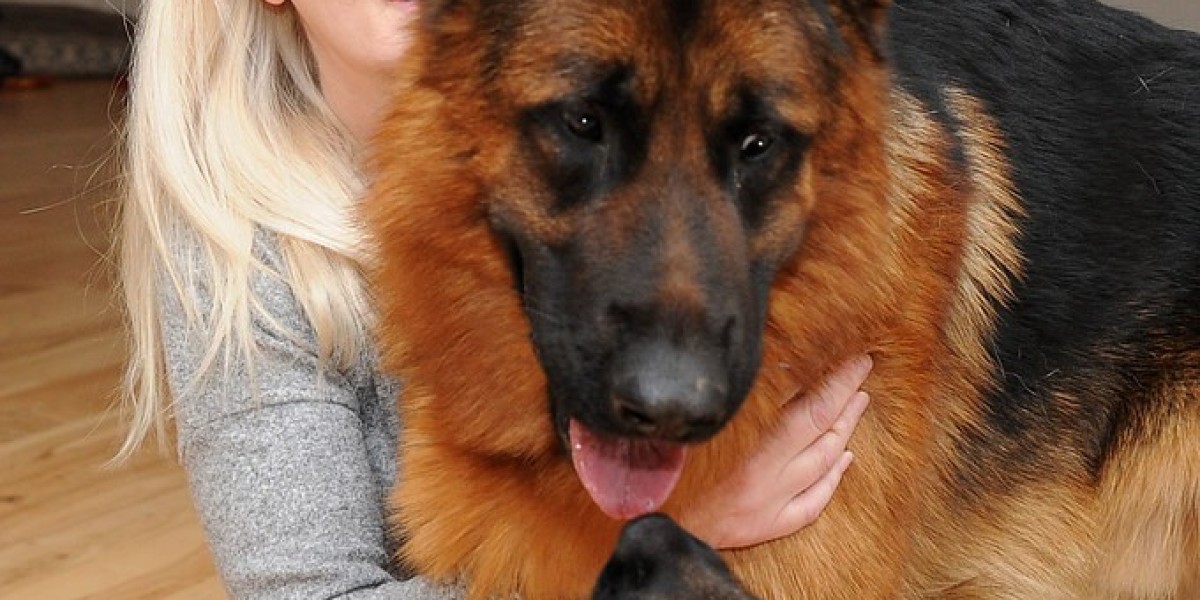The GSD represents the perfect balance of agility and strength. Its exceptional training ability and natural protective instincts make them cherished family dogs.
 If you are looking for a purebred German Shepherd Choose breeders who are concerned about the health of their dogs and practice ethical breeding. You can determine reputable breeders by requesting pedigree documents and prior health clearances.
If you are looking for a purebred German Shepherd Choose breeders who are concerned about the health of their dogs and practice ethical breeding. You can determine reputable breeders by requesting pedigree documents and prior health clearances.Characteristics
German Shepherds are powerful, intelligent dogs that are highly trainable. They are loyal to their family and can be fearless guardians. The breed standard says that the GSD must be stable of temperament, self assured and courageous. It must also be tractable and willing to be a pleasure to.
The breed is medium-sized with a slight elongation and is muscular. It has a double coat that consists of an outer layer of hardness, and a soft undercoat. Its eyes are dark and almond-shaped, and positioned slightly obliquely. The ears are pointed and wide at the base. The tail is bushy and reaches to the hocks below when the dog is lying down. The neck of the breed is long and sloping slightly. The chest is broad and deep. The spine is firm and the ribs are well-sprung.
The breed is generally healthy, but it has serious issues, like roached-backs and long pasterns that hinder proper movement. Its hindquarters must be powerful but not exaggerated. The rear leg should never go beyond the point where the foot leaves a mark.
As working dogs, the GSD has naturally high drives (behavioral tendencies and desires for things like territorial protectiveness and chasing prey). If these drives are not fulfilled in a particular way, for example playing or at work and it can lead to aggressive behavior. Show-type German Shepherds are bred in a manner that can help reduce these urges however they still require a lot of positive reinforcement training, physical exercise and mental stimulation to maintain an enlightened lifestyle.
GSDs are generally reserved and suspicious towards strangers initially. This protective trait makes GSDs excellent guard dogs, however it requires proper training to avoid overreactions. They make wonderful family pets when properly socialized at a young age and they're generally great with children.
The GSD has an elevated pain threshold and is resistant to illness, but it does have certain health issues that could affect its quality of living. These include seizures, epilepsy, bleeding disorders, and immune-mediated diseases. Taking precautions such as limiting the dog's exposure UV rays and making sure that regular vaccinations are given to the dog will reduce the chance of developing these conditions.
Temperament
German Shepherds are smart and eager to learn. They are also capable of being trained. They are an active dog breed that excels at many jobs, such as police work, herding and search and rescue. They also excel in bomb and drug detection and aiding blind people. They are also excellent family companions. However, this strong and confident breed requires a clear sense of purpose and the attention of an assertive owner to use their strength and energy in a positive manner. They require plenty of exercise and room, and might not be suited in smaller living spaces.
The ideal German Shepherd is well-balanced and confident, with a firm and steady temperament. They are loyal, alert and sceptical of strangers. This guardian and attentive behaviour can become aggressive when not properly trained, socialized and supervised. They are extremely intelligent and can be insecure and bored, and they require a good outlet for their natural curiosity.
Founder Max von Stephanitz used herding and farm dogs, as well as longhaired and short-haired German Shepherds in his breeding program to create the obedient and responsive breed that we know today. He disagreed with people who wanted German Shepherds to be a showpiece and he made sure his dogs had stable temperaments, strong herding instincts, and a sound body structure. He even resisted breeding with dogs that had temperaments that were unstable or had steep angles in their croups as well as rear and front pasterns since he believed that these traits could hinder the ability of the breed to perform its traditional work.
In addition to the hereditary diseases that can plague any breed of dog, German Shepherds are prone to cancers such as hemangiosarcoma, which most commonly affects blood-rich organs like the spleen and liver. They can also develop lung, bone or intestinal cancers.
You can prevent these conditions by maintaining the physical well-being of your German Shepherd. This means providing him with a nutritious diet and regular exercise. Make sure he gets plenty of opportunities to exercise and play outdoors, in a safe area away from traffic and other dangers. Keep him looking neat by brushing his dense double coat on a regular basis, using a de-shedding tool or undercoat rake to remove loose hairs. It is recommended that you visit your vet regularly for routine health checks.
Health
German Shepherds are generally healthy dogs, but they do have certain health issues. They are susceptible to ear infections, and they can develop ailments that affect their eyes and ears, like degenerative myelopathy. They may also suffer from a genetic disease known as von Willebrand's disease that is hereditary which affects their ability to clot blood. It is present in both male and female dogs.
GSDs are a working breed, and consequently, they are subject to rigorous training. As a result, they may develop joint issues. A common one is hip dysplasia. It is characterized by a lack of growth and development of the joint and cartilage that can result in lameness, pain and other signs. It is not a major condition but can be painful to the dog.
Breeders who are reputable X-ray their dogs and use the results to make breeding decisions. The x-rays can aid in determining the health of the puppy as well as its genetic history, which includes the possibility that it could develop dysplasia. Dogs who are at a high risk of developing dysplasia aren't bred.
Like most large breeds, German Shepherds can suffer from panosteitis, which causes the bones to grow rapidly and unevenly, which causes pain and stiffness in the joints. This is more prevalent in German Shepherd puppies or dogs younger than 18 months old who are experiencing rapid growth.
The dogs require an diet rich in protein, with a large amount of omega fatty acids as well as balanced vitamins to support healthy coat and skin. These dogs can benefit from food that contains joint support, like glucosamine or chondroitin. Dogs who are less than 18 months old age should be exercising moderately including multiple walks and, if compatible with other dogs playing together, but should not be allowed to run at full speed as this could cause damage to joints that are growing.
Feeding table food or animal bones should be avoided, as these can cause vomiting, digestive upset anorexia, vomiting, and pancreatitis. Adults and puppies can benefit from probiotic supplements to aid digestion as well as digestive enzyme supplements that aid in breaking down proteins. Mineral and vitamin supplements are not required, as a well-formulated AAFCO-approved diet should provide the proper amount of these nutrients.
Training
German Shepherds are smart, highly trainable dogs who thrive when they're under the direction of a skilled handler. This makes them an excellent choice for police and military tasks, search and rescue and therapy dog roles, reinrassiger deutscher schäferhund züchter (from the xn--entzckendescferhundwelpen-wec35d.de blog) and many other specializations. But their inexplicably loyal nature makes them a wonderful family pet when properly trained and socialized.
Socialization is the first step towards creating a well-adjusted GSD. From an early age expose your puppy various animals and people. Take them on frequent walks and play games. Visit local dog parks. This will help them feel comfortable and secure in a new place and help them develop trust in humans at an early age.
It requires patience, consistency, as well as positive reinforcement to train a German shepherd. It is crucial to stay clear of negative reinforcement methods such as shouting and physical punishment as they can cause fear-based aggression. Instead, use reward-based training and clicker training to teach your German Shepherd basic commands.
Daily enrichment is important for your German Shepherd. Mental stimulation exercises can be equally important as physical exercise for a GSD particularly in a chaotic or busy household. This helps to keep their attention and focus, so they are less likely to be distracted by noises from the street storms or other dogs in the park, or crowds at sporting events and public events.
German Shepherds are susceptible to various health issues that include hemangiosarcoma (cancer of bones, lungs, and intestinal tract) and pannus (superficial Keratitis) and cancer. All of these diseases are preventable through responsible breeding and lifestyle changes.
German Shepherds are devoted family dogs, despite their reputation as a feared breed. They are often affectionate with children and gentle with smaller pets, such as cats, when exposed to them from a young age. They are extremely effective guardians due their size and strength, but they should be supervised when they are around young children. If they are not being exposed to enough training and socialization they could show signs of aggression. It is recommended to enroll your German Shepherd in a puppy preschool or obedience classes to ensure that they receive the training and socialization they require to flourish.








